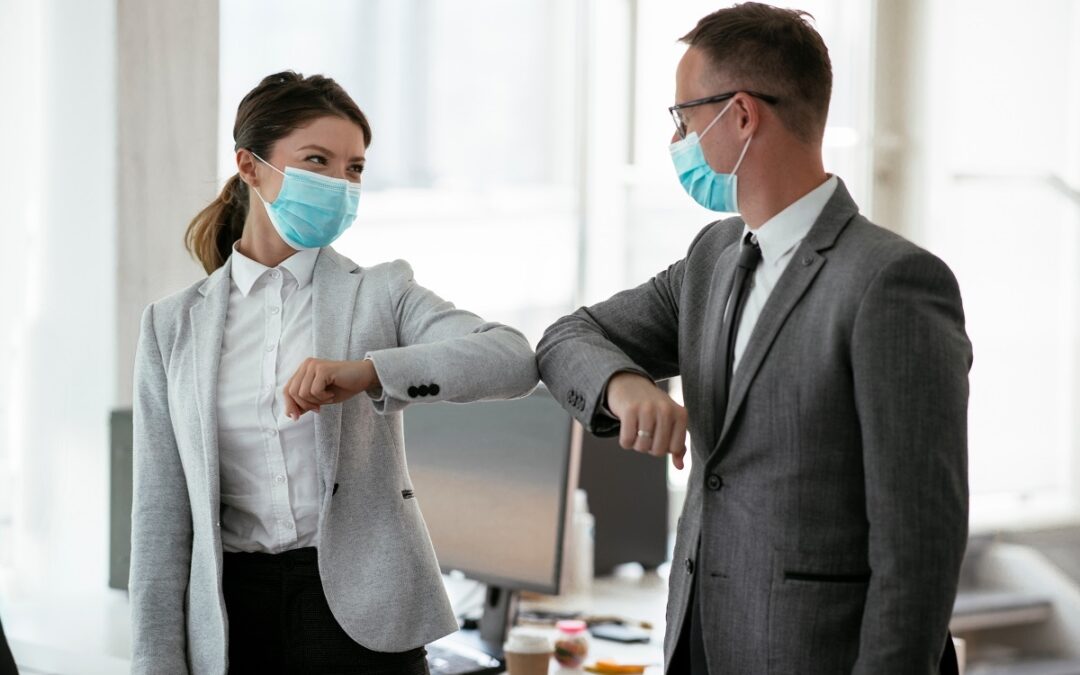No Going Back to Business as it Used to Be Usual
With the pandemic still raging and mass vaccinations months away, Colorado Springs employers that have reopened their doors face many ongoing challenges involving the health, safety, and well-being of employees returning to the office after COVID-19. As telecommuting or furloughed employees come back to the office after months at home, employers can’t just go back to business as it used to be usual.
Colorado Springs area employers need to understand their new responsibilities and obligations to avoid practical staffing problems as well as potential legal liability. Here are five fundamental issues that all companies must address involving their workforce returning to the office after COVID-19.
Maintaining a Clean and Safe Workplace
Under federal law, all employers have a duty to provide and maintain a safe workplace. In the pandemic era, keeping employees safe requires affirmative efforts, constant vigilance, and staying up to date on often-changing government guidance and restrictions.
As a baseline, Colorado employers should comply with all laws, orders, and other rules and directives established by state and local governments and public health authorities regarding indoor workspaces and employee safety. Employers can turn to the Centers For Disease Control and Prevention’s (CDC) guidance on the subject for general protocols and policies they can adopt.
CDC’s detailed suggestions for establishing and maintaining a safe and sanitized workplace include common-sense actions such as:
- Daily employee health and temperature checks
- Performing a workplace hazard assessment
- Requiring employees to wear masks and face coverings in the workplace
- Implementing policies and practices for social distancing
- Improving building ventilation systems
Supplying your returning workers with clean purified Colorado drinking water and high-quality in-office coffee brewers can also greatly increase a safe workplace. When you provide chemical-free water to your employees, you help maintain their physical health. And, granting them access to great-tasting office coffee will minimize the need for them to get their cup o’joe elsewhere, therefore minimizing their contact with others when they return to the office after COVID.
Employees Who Want to Continue Working Remotely Because They Feel Unsafe Returning to the Office After COVID
While everyone proves vulnerable to coronavirus, some people are at increased risk because of preexisting health conditions, such as immunodeficiency disorders. For such employees, the Americans With Disabilities Act (ADA) may require an employer to make a “reasonable accommodation” to allow the worker to perform their job in a way that accounts for their disability in the context of COVID-19.
Guidance from the Equal Employment Opportunity Commission (EEOC) addresses several pandemic-related employment and ADA issues.
You Might Like: Do Indoor Air Purification Systems Protect You From COVID-19?
Leave for Employees Who Must Care for Home-Bound Kids Or for Someone With COVID-19
In the early days of the COVID-19 pandemic, the federal government passed the Families First Coronavirus Response Act (FFCRA), which applies to employers with less than 500 employees. The FFCRA established a new type of protected leave: paid family and medical leave necessitated by the COVID-19 pandemic.
FFCRA leave is available to employees who must take time off because the employee:
- Has or possibly may have COVID-19
- Needs to care for someone in their household who has been diagnosed with COVID-19, or
- Must care for their minor children because their school, daycare center, or other child-care services are closed due to COVID-19.
The first two types of leave are limited to two weeks, but the third type (to care for a child) can run up to a total of 12 weeks.
The U.S. Department of Labor (DOL) issued helpful guidance for employers about their family and medical leave obligations under the FFCRA.
Employees Who Test Positive for COVID-19
Employers should establish protocols for handling employees who become sick or test positive for COVID-19. Again, CDC guidance provides a great source for direction about what to do, including such actions as:
- Quarantining infected employees
- Isolating employees working close to an infected coworker
- Cleaning, sanitizing, and disinfecting the office
- Notifying other employees who may be at risk for exposure from the infected worker
Requiring COVID Testing and Vaccinations
According to EEOC guidance, employers can require employees to test negative for coronavirus as a condition for returning to work. Specifically: “employers may take steps to determine if employees entering the workplace have COVID-19 because an individual with the virus will pose a direct threat to the health of others.”
Similarly, in most cases, employers can mandate their employees get vaccinated against COVID-19 and can fire them if they refuse, according to recently released EEOC guidance.
However, while employers can generally require employees to get the vaccine, there are exceptions under both the Americans With Disabilities Act (ADA) and Title VII of the Civil Rights Act for those with a legitimate religious objection to vaccination. Employers should consult with knowledgeable employment counsel to ensure they comply with their obligations under these laws.
Let Colorado Pure Help You Welcome Your Employees Back to the Office
At Colorado Pure, we provide Colorado offices and workplaces with the purest, highest quality water and the finest brewing equipment and coffee available on the Front Range. We are passionate about customer service and have a well-earned reputation for consistency, reliability, and trustworthiness.
To find out more about how we can help your employees feel better about returning to the office after COVID-19, please contact us for a free quote.
Read More on Office Water and Coffee Delivery
Does an Office Coffee Service Improve Employee Focus?
Pros & Cons of Bottleless Water Dispensers for Office Breakrooms





